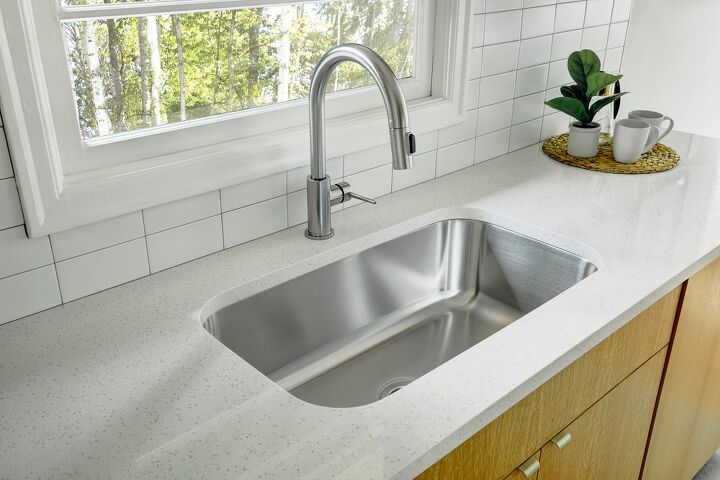16 Gauge Vs. 18 Gauge Sink: What Are The Major Differences?

A kitchen sink often faces a lot of abuse, from dropped pots to sharp utensils and more. If you don’t choose the right sink, you can end up with dents, scratches, or cracks, so a durable choice is essential. The thickness of your sink is an important factor, and a popular choice often makes you consider a 16 gauge vs 18 gauge sink.
The main difference between a 16 gauge and 18 gauge stainless steel sink is the thickness. A 16 gauge sink is 0.0625 inches thick, and an 18 gauge sink is 0.0500 inches thick. The 16 gauge sink is thicker and more durable, but it comes at a higher price tag. Most home pros recommend 16 or 18 gauge sinks for a kitchen.
It’s important to find a sink that can stand up to a lot of wear and tear and last a long time. You also don’t want to break the bank with a sink that’s over your budget. Both 16 gauge and 18 gauge sinks are popular choices. But it’s wise to know the similarities and differences before deciding on the best option for your home.
16 Gauge vs. 18 Gauge Sink: What Are the Differences?
Kitchen sinks come in all sorts of sizes and shapes, and one important aspect is their thickness. Stainless steel sinks note their thickness by their gauge, which refers to the actual thickness of the steel. The lower the gauge, the thicker the sink.
Typically, the thicker the sink, the more durable it’s going to be. Therefore, a 16 gauge sink must be the better choice, right?
But it’s not just about the thickness. Sure, thicker might be better, but it also often comes at a cost. Besides the thickness and cost, other differences involve the durability, weight, and even the noise factor.
So it’s essential to look at the overall picture and how you use your sink. When you assess all the information, you can decide which sink is ultimately the best choice for your space. Here is a breakdown and closer look at how a 16 gauge sink and an 18 gauge sink stack up against each other.
16 Gauge vs. 18 Gauge Sink: Thickness
The primary difference when it comes to a 16 gauge vs 18 gauge sink is the thickness. A 16 gauge stainless steel sink is 0.0625 inches thick. In comparison, an 18 gauge sink is 0.0500 inches thick.
Therefore, there is roughly a 20% difference between the two thicknesses, which might not seem like a vast difference. In a regular home kitchen, this difference might be barely noticeable. Or, if you spend a lot of time around the kitchen, you might be more aware of it.
However, in a more extreme environment, like a commercial kitchen, you’d most definitely notice an advantage. For example, you’d likely see the 16 gauge holding up a bit better long-term. In fact, the go-to for many commercial kitchens is a 14 or 16-gauge stainless steel sink.
But for a home kitchen, both a 16 gauge and an 18 gauge sink will work well. Therefore, most stainless steel kitchen sinks will usually be either 16 or 18 gauge.
Typically, the other differences you’ll notice between a 16 gauge vs 18 gauge sink stem from the difference in the thickness. Of course, if the price is the same, go for the 16 gauge, but that’s not usually the case.
Cost Difference
With the added thickness, a 16 gauge sink will typically cost more than a comparable 18 gauge sink. If you choose a similar style, size, and brand and the only difference is the thickness, the 16 gauge will likely run higher. But, that doesn’t mean you can’t find an affordable 16 gauge option.
In some cases, the price difference might only be one to two hundred dollars. Depending on your budget, that might seem like a lot, or it could be worth the difference.
Although some might consider a 16 gauge sink a luxury, you can always shop around for a better deal. But, if an 18 gauge sink provides adequate thickness for your needs, you’ll likely find a wider variety of affordable choices.
Maintenance and Durability of a 16 Gauge vs. 18 Gauge Sink
Obviously, the thicker the sink, the more durable it will be. That 20% added thickness does make a difference.
But it doesn’t mean an 18 gauge sink isn’t durable enough for your needs. However, if you use a lot of heavy pots and pans requiring a lot of handwashing, you might welcome the thicker gauge.
And even a thick sink can still show marks from knives and other sharp objects. However, it won’t show them as readily as a thinner sink. Still, you might find that even going with a 16 gauge, you’ll still need to get scratches out of your stainless steel sink from time to time.
Other Differences Between a 16 Gauge vs. 18 Gauge Sink
A couple of other things to consider are your sink’s weight and noise level. The thicker steel of a 16 gauge sink won’t be as noisy as a thinner one.
This quality is simply because the thinner sink will resonate more if you drop something on it. However, a 16 gauge sink offers more sound-deadening qualities.
The thicker, 16 gauge sink will weigh more than an 18 gauge sink because of the added steel. However, it isn’t a massive difference that would affect much in the way of installation. It’s just something to keep in mind when you’re making your final choice.
What Is the Best Gauge for a Kitchen Sink?
You’ll find that most home professionals recommend a 16 gauge or 18 gauge sink for a kitchen. Ideally, the 16 gauge would be the optimal choice since it’s thicker. The added thickness makes a 16 gauge sink more durable and quieter, both excellent features for a busy kitchen sink.
Although lower gauges, like a 14 gauge sink, are even thicker, they can be overkill for a home kitchen. You don’t want to sacrifice your wallet for something that’s more than what you need.
Conversely, you don’t want to try and save money by getting a sink that’s too thin. A 20 gauge sink might work for some, but a 22 gauge would almost be too thin for any kitchen. So, considering the big picture, a 16 gauge sink would be the best, but an 18 gauge is good too.
What Is the Most Common Gauge for a Kitchen Sink?
The most common choices for a kitchen sink are 16 gauge and 18 gauge, although some people will choose a 20 gauge. Usually, people pick the latter simply because it’s cheaper; they might even go with an even lighter sink. And unfortunately, they might not realize it’s because it uses thinner steel.
You can find 16 gauge and 18 gauge sinks at any home improvement store or online. Both thicknesses are popular choices, meaning you’ll typically find many styles and sizes of each.
What Gauge Is Best for a Stainless Steel Sink?
Deciding which gauge is best for your stainless steel sink all depends on how you plan to use it. Although 16 gauge and 18 gauge sinks are the most recommended for kitchens, this wouldn’t be the case in other situations.
For example, a thinner gauge might be okay if you need a small stainless steel sink for a lavatory. What if you only plan to use it for handwashing and brushing your teeth? Then you might opt for a less expensive 20 or 22 gauge.
But if you’re looking for a heavy-duty sink for a workshop or commercial kitchen, you’ll want to go even thicker. In these situations, you might want a 14 gauge sink or even a lower gauge.
Is a 16 Gauge Sink Worth It?
If you have it in your budget for the additional cost and use your kitchen sink a lot, yes. For added durability, quieter performance, and slightly easier maintenance, go with the 16-gauge sink. Also, often the price difference might not be too cost-prohibitive when comparing similar models.
But if it’s a significantly higher cost than the 18 gauge sink you’re eyeing, it might not be worth it. In this situation, you need to carefully consider how often you’ll use the sink and how. If a 16-gauge sink would be overkill, stick with the 18 gauge sink.
Summary
Shopping for a new sink is integral to your overall kitchen design. You want to find something that fits within your budget reflects your style, and will last a long time. Since kitchen sinks see a lot of use, finding a durable, long-lasting option is critical.
Stainless steel sinks are popular choices in a kitchen, but that doesn’t mean that all of them will work well. You want to pay attention to the thickness of the sink to ensure you get one that can hold up to lots of wear and tear. The most popular choices for kitchen sinks are 16 gauge and 18 gauge, which both offer a durable thickness.
16 gauge sinks are about 20% thicker at 0.0625 inches compared to an18 gauge sink’s 0.0500 inches. The added thickness makes 16 gauge sinks more durable but also usually more expensive.
However, they also tend to be quieter when you drop things in them. Ultimately, both sinks will do a good job. It’s up to you to decide which is best for your overall lifestyle and how you plan to use your sink.

Stacy Randall is a wife, mother, and freelance writer from NOLA that has always had a love for DIY projects, home organization, and making spaces beautiful. Together with her husband, she has been spending the last several years lovingly renovating her grandparent's former home, making it their own and learning a lot about life along the way.
More by Stacy Randall



























